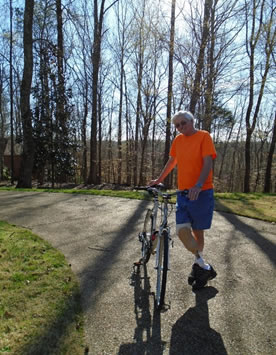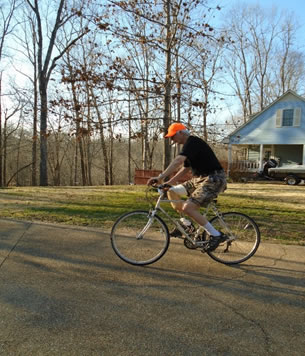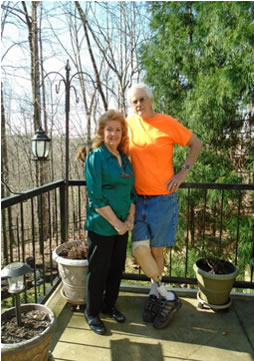

Age: 72 ½
Location: Elkmont, Alabama
Level of amputation: Right below knee
When was your amputation/How long have you been an amputee?
2013, three years
Do you use prosthetic devices? Yes
Occupation(s): Retired business owner
Hobbies/Activities: Hunting, Fishing, Sporting Clays, Reading, Snorkeling
What is your story? Wayne injured his right foot while walking outside. Complications from longstanding diabetes mellitus of 32 years, including poor circulation, contributed to a resulting five surgeries on that foot. He endured the gradual amputation of several toes and part of his foot as infection continued to spread up his leg, forcing Wayne to spend 45 days in the hospital in 2012. After almost a year of frustration from a lack of mobility, a certified peer counselor came to visit him about the possibility of amputation and he elected to have his right leg amputated below the knee in February of 2013.
Obstacles you have overcome: Wayne states stairs are an obstacle he has overcome. Towards the end of the interview, he had changed clothes to go to a meeting and when sitting back down, his wife mentioned that his pant leg was unzipped. Often times finding clothes to fit over a prosthesis can be challenging, especially when frequent socket adjustments are needed. They have overcome this obstacle by finding a seamstress that puts an inseam zipper on the right leg of his pants. The zipper is unseen and he is able to maintain a welldressed appearance while preserving the functionality of accessing his prosthesis. This is a great tip! It’s also helpful to have someone watching out for you in case you forget to zip back up, as in this situation, because you can’t feel when it’s unzipped!
Goals you have reached: Top stair
Goals you are still reaching for: Writing a bookhumorous of course.
What would you like to say to the community about amputees? “Allow us to be independent.” Wayne and Karen spoke of their experience snorkeling in Hawaii and how worried the boat crew was about Wayne getting in the water. They were laughing, telling the story, that the buoyancy in the saltwater of Hawaii made floating the easy part. Getting back in the boat required a little help. Independence can be a very important quality to amputees and help is appreciated when needed but much of the time amputees have developed their own ways of getting things done on their own terms.
What would you like to say to other amputees in the community? You will encounter others in tougher situations than yourself.
How do you cope with being an amputee/what is your support mechanism? Family and friends
Phantom pain: Wayne experiences occasional bouts of phantom pain, usually at night, describing them as sharp, knifelike, stabbing pains. The pain seems to be random without any known triggers. He uses supplements such as butcher’s broom for phantom pain and colostrum supplements to boost his immunity.
What inspires you to keep moving forward? Tomorrow
Amusing amputee story to share: Wayne went to a barber shop early one day and his prosthesis was not seated properly and hurting big time. A 3 or 4 year old boy was sitting on his father’s lap in the next chair. Wayne asked the barber to allow him to remove his prosthesis to give him some relief. He was a regular there and they knew he was an amputee. When Wayne removed his prosthesis the little boy’s eyes got huge and the expression on the little boy’s face was priceless!
Summary
Wayne has always been very physically active, owning his own business with his wife, Karen, competing in triathalons, riding his bicycle for 100 mile rides, and traveling. Maintaining an active lifestyle was very important for him to return to and motivated him to move forward. He even flew to a convention across the country the same month as his amputation. Wayne was walking on his prosthesis a month after amputation and is well known for his bike riding all over the neighborhood. He is tall, in great shape, and has a quiet presence with a great sense of humor. Our time together was full of wonderful, amusing stories and he greatly values seeing the comedy in situations. He and his wife Karen have an obviously strong, loving, and supportive relationship and enjoy many activities together. Due to his active lifestyle, Wayne has several different legs to accommodate those needs. He is a model for working hard, returning to an active lifestyle as soon as possible, not letting anything get in his way, and maintaining a positive and humorous outlook all the while. He has been an inspiration to others and enjoys talking to other people considering amputation.

Age: 71 ½
Location: Elkmont, Alabama
Relationship to amputee: Wife to
Wayne
Years as caregiver: In 2012, Wayne had five surgeries and was hospitalized for 45 days. His amputation was performed in 2013.
What do you recall being your first reaction when you found out about the amputation or learned it was imminent? Karen realized that amputation would mean a better life for her husband. Wayne was confined to a wheelchair for a year after his five surgeries and they were running a business together at the time. Mobility was a major issue as Wayne was accustomed to performing machine maintenance at the plant as well as many other major physical activities. He was frustrated with his situation. The wheelchair made it difficult for the simplest of activities, such as getting through doorways. Karen recognized that for him to return to any level of former activity, having an amputation and using a prosthesis would be the only way for him to return to his former active lifestyle.
What did you have to change about your lifestyle as a result of the amputation? She states that Wayne bounced back so exuberantly that they haven’t had to make many changes to their lifestyle. He requires more room when flying since he usually takes his leg off during flights so they now fly first class because of that. They ran a successful business for 23 years and ended up selling their business. Although this was a major life change, they state they were ready to retire.
What were some of the challenges you had to overcome as a result of amputation? Because of his resiliency, Karen notes that they have few challenges holding them back because he does everything he wants to do. She did make an excellent point that you must have the will to do all these things. It is hard work at times and you have to want to do it and stay motivated. She says the biggest challenge, especially since selling their business, is staying busy.
What are you still working on today? They try to stay as busy as possible and are trying to find more activities to fill in the time the business occupied.
The grieving process: Karen said that they really didn’t grieve the loss of the leg or their old lifestyle because they never stopped!
How did you stay strong during difficult times? She prayed for strength to help however she could.
Have you been inspired by your partner? In what way? Yes! He “continues to do what he wantsfishing, bike riding, etc.”
What are your goals for each other? “Would love to travel more!”
Do you have an amusing story involving the amputee? Wayne and Karen went to Hawaii in
November of 2013 to celebrate their 25th wedding anniversary since they were married there in
1988. His amputation was in February of the same year. They went snorkeling off the “Dolphin Star” and the boat attendants were very reluctant to let him jump overboard and kept trying to help him but the only help he needed was getting up the ladder onto the boat!
Summary
Karen goes to many support group meetings with Wayne and currently serves on the Tennessee Valley Amputee Support group board of directors. Her loving care and support of Wayne is evident and she encourages him to continue all the activities he enjoyed preamputation. It’s wonderful that she sees the possibilities in everything he can do and recognizes that without the amputation he would have been confined to a life very different from before with and very little mobility. For Wayne, this was the right decision. She says the visit from Shawn, an Amputee Coalition Certified Peer Support Visitor and a right above knee amputee himself, was an inspiration in helping Wayne make this decision. She mentions that hearing the information and possibilities from another amputee meant so much more than the information coming from someone who had never experienced amputation. She rightly states that no one can truly understand what it feels like to be an amputee without having an amputation. Karen is strong, motivated, positive, warm, and caring…a great caregiver!
Age: 46
Location: Huntsville, Alabama
Level of amputation: Left below knee
When was your amputation/How long have you been an amputee? April 2013, almost three years, the same weekend as the Boston Bombing.
Do you use prosthetic devices? Yes
Occupation: Production worker
Hobbies/Activities: Computer games, basic photography, Scifi, reading
What is your story?
Thomas was diagnosed with diabetes at age 25 and has had difficulty managing his blood sugar levels. He lost his left ankle to Charcot foot, which is a foot deformity that results from neuropathy. The loss of sensation from neuropathy can result in repeated injuries to the foot, causing weightbearing joints to deteriorate. The American Diabetes Association states that 6070% of those diagnosed with diabetes develop peripheral neuropathy and of those, 0.5% will develop Charcot foot.
Obstacles you have overcome: Thomas had one answer but a great one…”steps”.
Goals you have reached: He has learned to use his prosthesis and has adapted to a new lifestyle and its challenges. One of the challenges he sites is the time it takes “for your body to adapt to using different muscles or using the old ones differently”. Clothing to fit over a prosthesis, good shoes that make walking easier, and getting the proper ambulation devices such as a cane or crutches are also challenges he has faced in achieving his goals.
Goals you are still reaching for: Basic survival. How to improve my prosthetic or situation.
What would you like to say to the community about amputees?
“Thank you for your concern and help when I need it but please don’t make too big a thing of it. Just pay attention and help if it seems I need it; otherwise let me try if I can handle it. I may be handicapped but not helpless. Remember that my dignity is still there or trying to be.”
What would you like to say to other amputees in the community?
“Life will be different but not necessarily bad. You will see more of the helpful side of people. You will face challenges to overcome. You have an advantage during pirate dress up. Do your best to keep your sense of humor.”
How do you cope with being an amputee and what is your support mechanism?
“I’ve been fortunate to not care too much about losing the limb. I understand some really are emotional about the loss. There are other things that concern me more. I miss my carefree mobility but not severely so. I make fun of the situation whenever possible. I also have my faith, my friends, and the enjoyment of women holding the door for me to turn to.”
Phantom pain
“I do get phantom pains and sensations sometimes. Most often I feel like my ankle is sore similar to a sprain but not as intense. I haven’t figured out any triggers or cures.”
What inspires you to keep moving forward?
“I can’t moonwalk, so backwards isn't an option. Life goes on. What other choice is there??”
Amusing amputee story:
“Before I got my prosthetic, children would ask me what happened. I would pout and tell them I didn’t eat all my vegetables. My sisters claimed I was mean. I would counter that I could have said the monster under the bed got me. “
“Also, the teenagers at my church thought it was hilarious when I would do ninja kicks with my stump. You can really move that thing fast without the extra weight on the end.”
Summary
Thomas’s down to earth intelligence and sense of humor is a great example for resiliency in coping with amputation. Often humor helps put the amputee and those in contact with the amputee at ease and helps enable communication. The chronic and adverse effects of diabetes mellitus on the body are often disabling and those with a resulting amputation must deal with the challenges of losing a limb while also continuing to manage this disease. Thomas maintains employment through adversity and strives to better himself and his situation. He has a wonderful disposition and is a joy to be around. His humor always elicits a welcome smile and laugh and his tenacity is to be admired.